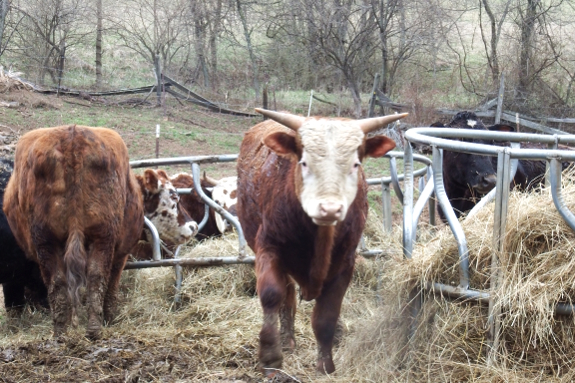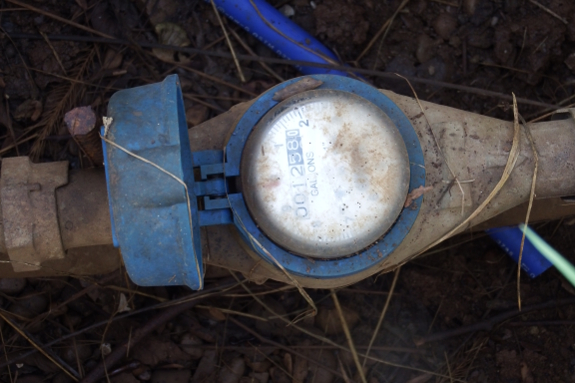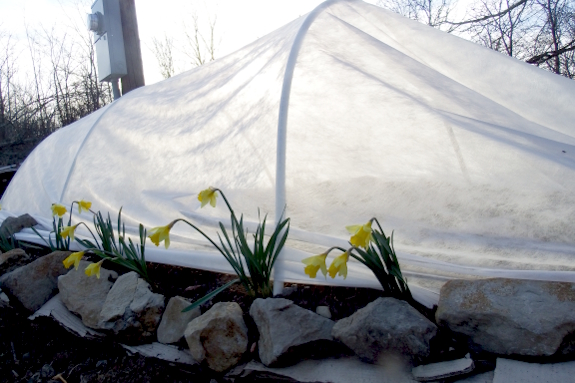
Planning to hoard water

Even just a couple of
miles down the road in a less exposed location, mud season is still
very real. But up here on our ridge, the soil is bone dry. Clearly,
we're going to have to get our irrigation setup working sooner rather
than later.

To Mark's joy (no
jury-rigging solutions out of baling twine and shoestrings!) and my
disgust (chlorine, fluoride, energy-intensive, money-squeezing, limited
supply!), we're on city water in our new location. I can't recall
exactly how much we're allowed to use each month for the base rate ---
I think 500 or 600 gallons? So far, we're using about half that, but
gardens are thirsty beasts.

So we're starting to brainstorm the best solution. The first step will be gutters...but where should we channel the precious off-flow? I go back and forth between spending some cash to build as big a pond as we can fit at the edge of our yard, creating an in-ground cistern out of concrete, or just going the plastic storage tank route. I'm all ears if anyone has first-hand results of any of those options!
Want more in-depth information? Browse through our books.
Or explore more posts by date or by subject.
About us: Anna Hess and Mark Hamilton spent over a decade living self-sufficiently in the mountains of Virginia before moving north to start over from scratch in the foothills of Ohio. They've experimented with permaculture, no-till gardening, trailersteading, home-based microbusinesses and much more, writing about their adventures in both blogs and books.
Want to be notified when new comments are posted on this page? Click on the RSS button after you add a comment to subscribe to the comment feed, or simply check the box beside "email replies to me" while writing your comment.

Besides the short-term rain barrels, if they are mosquito-proof, I'd say, to figure out how to use your sink and washingmachine gray water (if soapy water is useable).
And maybe you need to put one of your raised beds on the N or E side of the trailer, since this will help the more-shaded ground from drying out as much.
Last, I'd really make sure your raised beds are not too high off the ground, since I guess this, too, dries the soil more.
Or maybe you can even plant some taller perennials on the S and W sides of your raises beds?
I think ponds do evaporate in high heat, even if they are shaded.
Another possibility to consider would be making a ferrocement tank. Lots of good videos on YouTube available (as well as books).
Could also be combined with small-scale aquaculture to provide a little additional boost of nutrients.
Another possibility is to check with the state department of agriculture/conservation to see if there are any resources to help build a pond. In some states, there are cost-share programs which could help reduce the expenses.
Plastic degrades over time and I'd be worried about chemicals from the plastic leaching into the water -- especially if the plastic is exposed to UV light.
Taking a systems approach, a couple of different approaches suggest itself.
Probably the best solution would mean to modify the soil to retain more water. This would be a one-time investment but would be relatively low on maintenance compared to a water system. Maybe try to create terra preta, or adding a layer of waterproof clay beneath the growing beds.
If you want to capture and store water, the question is where the water comes from. Run-off from the roof will be relatively clean, but is your roof surface large enough for the needs of your garden? Such clean water could be stored in secondhand IBC's like you've done before.
Run-off from the land will contain soil, so it would probably silt up a reservoir over time. That would mean you need a reservoir that can be easily cleaned. Preferably with power equipment like a backhoe, because shovelling a cubic yard of silt out of a reservoir is easier said than done. A pond (lined with clay) is probably a good solution there. You would lose some water through evaporation, though.
A cistern (beneath the frost line) would be a good solution to prevent evaporation and deliver usable water year-round. However, building a good waterproof concrete cistern is not easy. Normal factory concrete contains more water than necessary for the hydration reaction, leading to a network of small channels in the concrete.1 You need to take special precautions to make a waterproof concrete construction2, but it is possible.
Hence the popularity of (rotation moulded) thermoplastic tanks for water systems. Since these are generally buried underground, degradation in sunlight and destruction by freezing are not an issue. But access is limited to a manhole or two, so cleaning out silt/deposits would be a heck of a job. Also, such a plastic tank could probably be damaged by a shovel, so you'd have to be somewhat careful with it. Realistically, if you want to store the run-off from your land in a cistern you'd probably want to build a settling pond to catch silt before the water goes into a cistern.